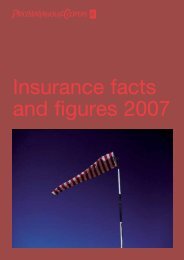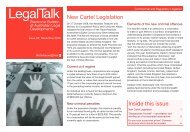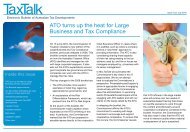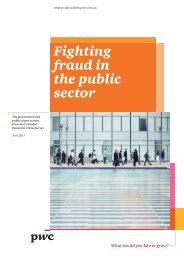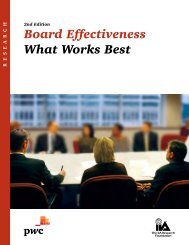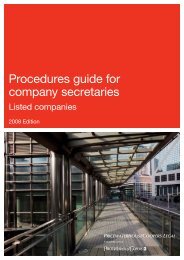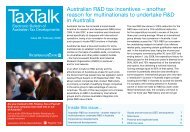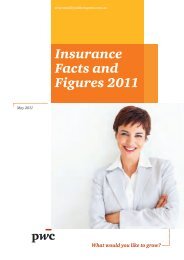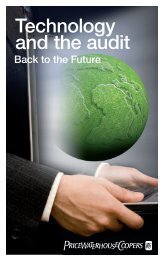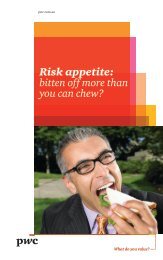Thin capitalisation: eroding asset values and increasing debt ... - PwC
Thin capitalisation: eroding asset values and increasing debt ... - PwC
Thin capitalisation: eroding asset values and increasing debt ... - PwC
You also want an ePaper? Increase the reach of your titles
YUMPU automatically turns print PDFs into web optimized ePapers that Google loves.
TaxTalk – Electronic Bulletin of Australian Tax Developments<br />
Other news<br />
End of the trust cloning<br />
CGT concession<br />
For further information, please contact your<br />
usual PricewaterhouseCoopers adviser, or:<br />
Inspector-General of<br />
Taxation report into the<br />
ATO’s management of<br />
major complex issues<br />
On 29 October 2008, the Assistant<br />
Treasurer <strong>and</strong> Minister for Competition<br />
Policy <strong>and</strong> Consumer Affairs released the<br />
Inspector-General of Taxation’s report<br />
Improvements to tax administration<br />
arising from the Inspector-General’s<br />
case study reviews of the Tax Office’s<br />
management of major, complex issues.<br />
The report is the fourth <strong>and</strong> final report<br />
on major complex issues.<br />
As noted by the Assistant Treasurer,<br />
the report summarises systemic<br />
issues arising from three earlier case<br />
studies conducted by the Inspector-<br />
General in 2007 relating to service<br />
entity arrangements, living away<br />
from home allowances, <strong>and</strong> research<br />
<strong>and</strong> development syndicates.<br />
Included in the report are agreements<br />
reached between the Inspector General<br />
<strong>and</strong> the Australian Tax Office (ATO) on<br />
changes to be made by the ATO to its<br />
work practices, including:<br />
• agreement on the timeframe in which<br />
the ATO will reach a view on priority<br />
technical issues<br />
• agreement on the process to be<br />
used in managing the achievement<br />
of agreed milestones on complex<br />
technical issues<br />
• introduction of initiatives to ensure that<br />
compliance actions are fair <strong>and</strong> based<br />
on a contemporary appraisal of the<br />
factors that have led to the issue<br />
• a commitment to clarifying the law<br />
through litigation of contentious areas<br />
<strong>and</strong> to generally provide test case<br />
funding to achieve this objective<br />
• agreement to consolidate the ATO’s<br />
information on significant technical<br />
issues into one site on the ATO’s<br />
website within two years<br />
• agreement that once the ATO<br />
concludes that its view on a matter has<br />
changed, the existing public advice<br />
or guidance should be withdrawn<br />
immediately <strong>and</strong> the ATO should<br />
clearly indicate whether replacement<br />
advice or guidance is required.<br />
On 31 October 2008, the Assistant<br />
Treasurer <strong>and</strong> Minister for Competition<br />
Policy <strong>and</strong> Consumer Affairs announced<br />
that the capital gains tax (CGT) ‘trust<br />
cloning’ exception to CGT events E1 <strong>and</strong><br />
E2 will be removed with effect for CGT<br />
events happening after 31 October 2008.<br />
CGT event E1 happens when a trust is<br />
created, <strong>and</strong> CGT event E2 happens<br />
when an <strong>asset</strong> is transferred to an<br />
existing trust. In the case of both events,<br />
an exception applies where the <strong>asset</strong> is<br />
transferred from another trust “<strong>and</strong> the<br />
beneficiaries <strong>and</strong> terms of both trusts are<br />
the same”. This has often been referred<br />
to as the ‘trust cloning exception’.<br />
The other exception to CGT events E1<br />
<strong>and</strong> E2 will be retained – that is, where<br />
the taxpayer is the sole beneficiary<br />
of the relevant trust that is not a unit<br />
trust <strong>and</strong> the taxpayer is absolutely<br />
entitled to the <strong>asset</strong> as against the<br />
trustee. A mere change of trustee of a<br />
single trust will continue not to trigger<br />
a taxable CGT event.<br />
The Assistant Treasurer has indicated<br />
that legislation will be introduced as soon<br />
as practicable <strong>and</strong> that initial consultation<br />
will be undertaken on the design of<br />
these amendments.<br />
Paul Brassil, Partner<br />
(02) 8266 2964<br />
paul.brassil@au.pwc.com<br />
Tony Carroll, Partner<br />
(02) 8266 2965<br />
tony.carroll@au.pwc.com<br />
Paul O’Brien, Partner<br />
(03) 8603 4182<br />
paul.obrien@au.pwc.com<br />
Demutualisation of friendly<br />
societies: CGT relief to<br />
be provided<br />
On 24 October 2008, the Assistant<br />
Treasurer <strong>and</strong> Minister for Competition<br />
Policy <strong>and</strong> Consumer Affairs announced<br />
that the Government will provide capital<br />
gains tax (CGT) relief for policyholders<br />
of friendly societies who receive shares<br />
when their friendly society demutualises.<br />
The Assistant Treasurer also indicated<br />
that the Government would undertake<br />
consultation on the design of the<br />
amendments. In this respect, a Treasury<br />
discussion paper has been released for<br />
public comment with the closing date<br />
for submissions being 5 December 2008.<br />
PricewaterhouseCoopers : 21



